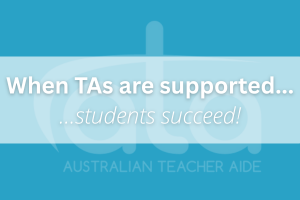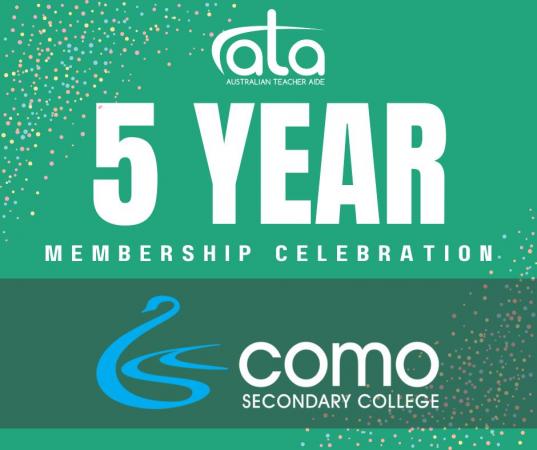Three Reasons your School may not be Getting Maximum Value from your Support Staff
 What if there was one factor, largely overlooked by schools, that has the potential to contribute to improved student outcomes, provide teachers with more time to focus on the important job of teaching and lead to a stronger school culture? Does that sound a bit far-fetched?
What if there was one factor, largely overlooked by schools, that has the potential to contribute to improved student outcomes, provide teachers with more time to focus on the important job of teaching and lead to a stronger school culture? Does that sound a bit far-fetched?
Extensive international research shows that the way schools utilise their paraprofessional workforce may be inhibiting school potential rather than enabling it.
In Australia, depending on which State, Territory or education sector we are talking about, this includes teacher aides, education aides, integration aides, school officers, TAs, teaching assistants and classroom assistants.
There are 71,700 education aides employed in Australian schools. This figure is said to grow by over 20 % in the next 5 years. The majority are women and around 75% work part time. It is likely this figure is higher as there are many TAs who work as volunteers and parent helpers.
Yet there seems to be little evidence of a national approach to ensure that the potential of the education support workforce contributes directly to student outcomes.
Schools vary significantly in size, complexity and the ability to lead their TA workforce. With teachers and school leaders already overstretched with duties that often remove them from their core role of teaching and learning, it is not surprising that the school’s paraprofessional workforce is sometimes overlooked, or perhaps placed at the bottom of the never ending “must do” list.
However, if research indicated that effective use of education support staff can contribute to improved student outcomes, and support teachers by enabling them to focus more on teaching and learning, would you consider reviewing your “to do” list?
Here are three reasons your school may not be getting the maximum value from education support staff:
Reason 1: Lack of a Whole School Approach
When schools include education support staff as part of their performance improvement and development plan, they are not only building the capacity of all staff, they are providing teachers with support staff who are skilled and who hold a clearly defined support role. This allows teachers more time to focus on teaching and learning.
Consider your school culture. How are support staff included? What knowledge and skills do education support staff at your school tell you they need to best support learning in the classroom and at individual student level?
What is your school’s process for identifying the professional learning needs of education support staff to ensure they are working to their potential and that students are best supported in learning?
A whole school collaborative approach to developing the capacity of staff, has learning at its core, with the clear purpose of improving student outcomes.
According to the Hays Group paper, Growing our Potential (2012) an effective performance improvement and development framework requires a cultural change that begins with putting development first, to engage the hearts and minds of the adult learner.
 Reason 2: Approach to deployment
Reason 2: Approach to deployment
Over the years I have had the opportunity to talk with hundreds of teacher aides and ask them what they love about their job. Without a doubt, the unanimous response is their love of working with children and helping them learn. (It certainly isn’t the money!)
On the other hand, support staff said that a lack of confidence, was one of their biggest barriers to feeling like they were doing their job well. There were many factors that contributed to this, but some of the key ones were an appropriate level of knowledge of curriculum content, having the necessary understanding of strategies used by the teacher, and the skills to provide the appropriate level of support to students.
A performance improvement and development plan, that provides opportunities for support staff to engage in professional learning and receive constructive feedback, mentoring and coaching are all part of a whole school collaborative approach, where the overall vision is student learning.
This approach is made possible when leadership teams collaborate with the staff who regularly manage the timetabling and day to day administration of support staff, to ensure that student learning and sound pedagogical practice is at the front and centre of all deployments decisions.
Reason 3: Lack of planning and preparation time
There are several reasons for the lack of preparedness of many support staff. One of these is timetabling. Teachers and support staff are given very little, if any work time to communicate with each other. This often means that many support staff rush from one class to another and do not know what they will be doing until they get there.
Likewise, most teachers say that they were given little or no training to work with support staff, and many presume that the classroom aide knows what to do. In schools where teachers and support staff work effectively together, there is a clearly articulated and explicit communication process, where information about lesson expectations and support strategies are shared ahead of time, rather than ‘just in time’. In schools where support staff are enabled to collect quality feedback on student learning, teachers are able to plan future learning tasks that lead to student succcess.
Australian Teacher Aide (ATA) recognises that many schools want to improve the capacity of both their teachers and teacher aides to work together more collaboratively, but simply don’t have enough time. As a starting point, ATA has identified the enablers that have the potential to facilitate better collaboration between teachers and teacher aides.
Our one-page School TA Workforce Survey is intended to assist school leadership teams to identify the potential of their education support workforce, and provide a starting point for collaboration, relevant to your school culture and strategic direction.
If your school would like to know more about ways to maximise the potential of your education support staff, Contact ATA to discuss how we can support your school with practical and relevant professional development solutions.


